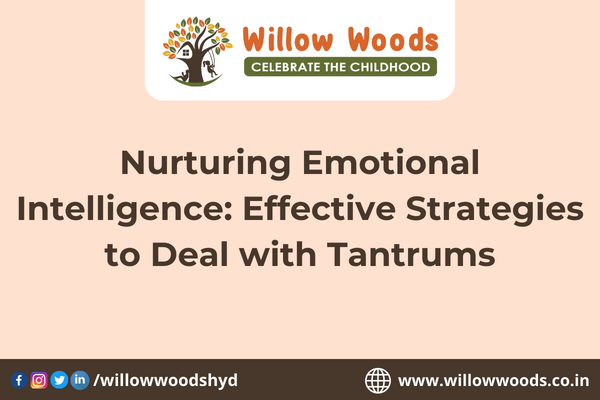Introduction Have you ever seen a toddler comfort a friend with a hug or share their toy with a smile? That, right there, is emotional intelligence in action. At Willow Woods Pre School, we believe that growing minds need more than ABCs and 123s—they need emotional literacy, empathy, and resilience. In a world that’s constantly
At Willow Woods School, we understand that young children may experience moments of frustration and exhibit tantrums as they navigate their emotions and develop social skills. Tantrums are a normal part of childhood, but as parents and educators, it is essential to guide children through these challenging moments in a supportive and empathetic manner. In this blog article, we will explore effective strategies to help you deal with tantrums, promoting emotional intelligence and fostering a positive environment for your child’s growth and development.
Stay Calm and Model Emotional Regulation:
When faced with a tantrum, it is crucial to remain calm and composed. Children often look to adults for guidance on how to manage their emotions. By modeling emotional regulation, you can provide a positive example for your child to follow. Take deep breaths, maintain a soothing tone, and avoid reacting impulsively. Your calm presence will help your child feel more secure and assist them in learning to regulate their emotions.
Validate Your Child’s Feelings:
Empathy plays a vital role in dealing with tantrums. Take a moment to acknowledge and validate your child’s emotions. Let them know that it’s okay to feel angry, frustrated, or upset, but also help them understand appropriate ways to express those feelings. Use phrases like, “I understand you’re upset right now,” or “It’s okay to feel angry, but we need to find a better way to communicate.”
Create a Safe and Quiet Space:
Sometimes, children need a moment to calm down and collect themselves. Designate a specific area in your home or classroom where your child can retreat during a tantrum. This space should be safe, quiet, and free from distractions. Encourage your child to use this space as a peaceful retreat when they feel overwhelmed, allowing them to regain control of their emotions.
Establish Clear and Consistent Boundaries:
Consistency is key when it comes to managing tantrums. Establish clear boundaries and expectations for your child’s behavior. Communicate these boundaries in a calm and firm manner, ensuring your child understands the consequences of their actions. Consistency provides a sense of security and helps children develop self-discipline and emotional regulation skills.
Teach Problem-Solving and Communication Skills:
Tantrums often occur when children are unable to effectively communicate their needs or solve problems. Teach your child age-appropriate problem-solving skills and encourage them to express their feelings using words. Help them identify their emotions and provide alternative ways to communicate their needs. By empowering your child with effective communication tools, you can reduce frustration and minimize the occurrence of tantrums.
Reinforce Positive Behavior:
Recognize and reinforce positive behavior to encourage emotional growth and self-control. Praise your child when they manage their emotions appropriately, use effective communication, or find alternative ways to express themselves. Positive reinforcement boosts self-esteem and motivates children to continue practicing positive behaviors.
Conclusion:
Dealing with tantrums requires patience, understanding, and a nurturing approach. At Willow Woods School, we prioritize the emotional well-being and growth of our students. By implementing these strategies, you can guide your child through tantrums, promoting emotional intelligence and fostering a positive and supportive environment. Remember, each child is unique, and it may take time and practice to develop effective coping skills. Together, as parents and educators, we can help our children navigate their emotions and grow into emotionally resilient individuals

